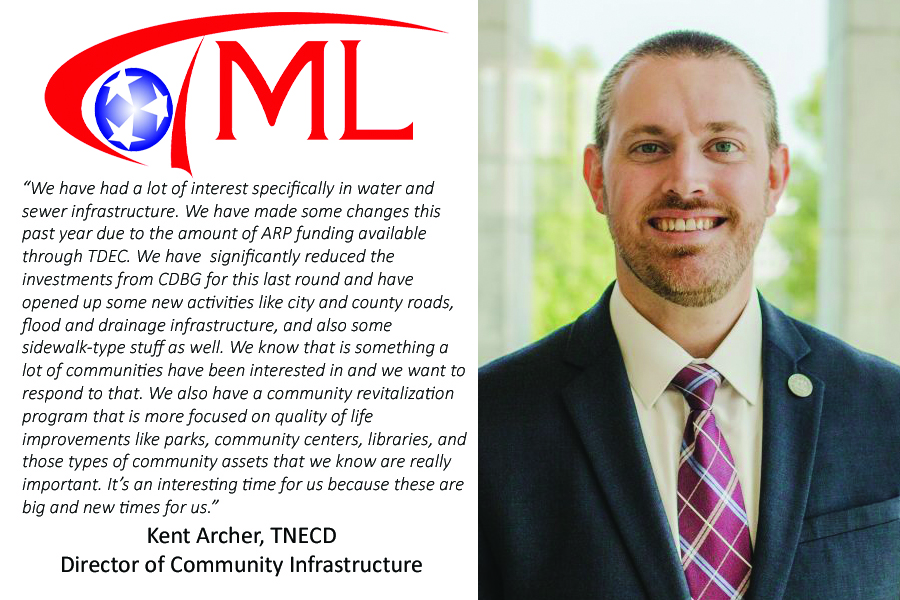State funds available for Blue Oval housing, child care, and industrial infrastructure projects
By KATE COIL
TML Communications Specialist
State programs can provide funds to address housing, child care, and the development of industrial sites for suppliers in communities being impacted by the Blue Oval City Development.
Officials provided information about state funding available to help meet growing community needs as part of a webinar hosted by the Tennessee Department of Economic and Community Development (TNECD).
With ARP funds providing new opportunities for water and sewer infrastructure projects, state officials noted that there may be some realignment of CDBG funds to help with other needs in communities, ranging from constructing roads and flood mitigation to supporting community needs like libraries, community centers, and child care.
CHILD CARE
Suzanne Carr with the Tennessee Department of Human Services (DHS) said the pandemic has further highlighted the need for affordable child care. In order to help facilitate this, she said DHS has several programs that can help with establishing new or expanding current child care facilities.
 “We know child care is an issue, having spots in child care, and having enough child care is an issue,” Carr said. “This is a problem statewide, but especially in the West Tennessee region. The opportunity with Ford coming to town will also mean an influx of people.”
“We know child care is an issue, having spots in child care, and having enough child care is an issue,” Carr said. “This is a problem statewide, but especially in the West Tennessee region. The opportunity with Ford coming to town will also mean an influx of people.”
The Child Care Establishment Grant is for those interesting in opening new child care facilities and require state licensure and completion of certain programs. This program cannot fund buildings, but can provide funds for everything within a building ranging from furniture to equipment, supply, curriculum, consultants, and coaches.
The Child Care Expansion Grant provides similar funds for those facilities interested in expanding. However, there are funding programs through ECD that can help with capitol improvements, site acquisition, and construction as federal regulations prevent the DHS programs from doing so.
Kent Archer, director of community infrastructure with TNECD, said CARES Act CDBG funding may help with assistance to child care facility capital costs associated with expansion, construction, and acquisition.
“We don’t know what the future of this program looks like. It is a pilot program underneath the CARES Act umbrella,” Archer said. “We wanted to respond to the most immediate needs as a result of the pandemic, and childcare is something that really rose to the top. We are seeing a lot of interest, and we are on a tight timeline. Our hope is that we can show there is a demand and something we need to look at in the future with CDBG funding or with another funding source.”
Archer said these funds are part of a planned realignment of how the state distributes CDBG funds because of the amount of other federal dollars coming down the pipeline for water and sewer infrastructure. Historically, Archer said water and sewer funds have made up the bulk of CDBG funds, which can also be used for emergency services and housing rehabilitation.
“We have had a lot of interest specifically in water and sewer infrastructure,” he said. “We have made some changes this past year due to the amount of ARP funding available through TDEC. We have significantly reduced the investments from CDBG for this last round and have opened up some new activities like city and county roads, flood and drainage infrastructure, and also some sidewalk-type stuff as well. We know that is something a lot of communities have been interested in and we want to respond to that. We also have a community revitalization program that is more focused on quality of life improvements like parks, community centers, libraries, and those types of community assets that we know are really important. It’s an interesting time for us because these are big and new times for us.”
Additionally, DHS provides a Child Care Subsidy Program that helps low-income families pay for child care. Carr encouraged city leaders to work with child care facilities not currently enrolled in the subsidy program to do so in order to remove barriers for families.
Communities may also be interested in TANF Community Grants to government agencies and non-profits that help with organizations that offer services to low-income families dealing with education, job training, workforce development, health, well-being, economic stability, housing assistance, and building strong families.
HOUSING
With the Ford plant expecting to employ 6,500 workers itself, being able to provide affordable housing is a concern many communities in the area have expressed. Jeremy Heidt, director of industry and governmental affairs at the Tennessee Housing Development Agency (THDA), said the main things local governments can help with are buying property, identifying areas of their community where they want to encourage residential development, and working with developers on PILOT programs or providing land through trusts to help lower development costs.

With many developers contacting cities in the region, Heidt said it is important for cities to look into developers before making any agreements.
“I would check with the state Department of Commerce and Insurance,” he said. “Anyone who is building houses and doing developments is going to be listed there. Check with the Better Business Bureau or look at developments they have done in other communities. That track record is what you are going to rely on. I would encourage you to go to other places they have built and talk to residents and local officials there to see what their experience was like. That will be the biggest tell tale of how they will work with you.”
Heidt said the agency has several programs aimed at housing that can be broken down into three major categories: development programs, mortgage programs, and community programs. Development programs through THDA are largely focused on affordable apartment complexes, often a necessity when a large number of people need to be housed all at once. The agency’s two main development programs are the Low-Income Housing Credit Program (LIHC) and Multifamily Tax-Exempt Bond Authority (MTBA).
The LIHC program is an incentive for private builders to keep rents lower and focuses on preserving and expanding affordable rental housing. Often times, developers make PILOT program arrangements with local governments to support these programs. MTBA has TDHA issue private activity bonds to preserve and expand rental housing.
THDA’s mortgage programs include the Great Choice Home Loans program and the Freddie Mac HFA Advantage. The Great Choice program is more aimed at first-time homebuyers with discounts of military members and veterans while the Freddie Mac program doesn’t require participants to be first-time homebuyers and offers the lowest mortgage insurance rate offered through Freddie Mac. Heidt said the Great Choice program also sometimes work in conjunction with their Down Payment Assistance Program, which provides 6% or $6,000 down payment assistance.
Heidt said THDA also works with community programs such as the federally-funded HOME Program to provide homeowner rehabilitation, down payment assistance, development of rental housing, and community housing development organization development for homeownership. A newer program is the federal Housing Trust Fund, which is primarily of interest to public housing authorities and nonprofits as it requires a long establishment period.
INDUSTRIAL DEVELOPMENT
With Ford suppliers also interested in moving into the area, preparing sites for additional industrial development has been a focus for many cities. Kirby Lewis, site development director with TNECD, said there are three major ECD programs dealing with site development: the Select TN Certified Sites, the Property Evaluation Program, and Site Development Grants. The next round for these programs will be starts in August of this year.
 “When we see a local government that is investing in their industrial property, that speaks a lot to us and tells us we need to invest there as well,” Lewis said.
“When we see a local government that is investing in their industrial property, that speaks a lot to us and tells us we need to invest there as well,” Lewis said.
Lewis said eligible activities under site development grants include construction activities such as roadway construction and electric, water, sewer, gas, or telecommunications infrastructure or property-related activities such as acquisitions of sites, rights-of-way, easements, and associated fees as well as vegetation clearing, grading, and drainage.
Due diligence grants can cover engineering, environmental assessments, grading plants, topographical surveys, boundary surveys, and more. Due diligence grants have a three-year minimum option or be on publicly owned property.
Lewis said the overall goal of the programs is to help give local officials the confidence they need to sell their sites to companies and encouraged cities to be proactive about site development.
“Having high-quality, affordable sites in your community are key to landing Ford suppliers,” he said. “We know Ford is moving very quickly, and those suppliers will be moving right behind them. A lot of those suppliers will be locating on-site, but there will be suppliers to the suppliers to the suppliers. Be ready for some of those properties you have been working on and preparing.”
